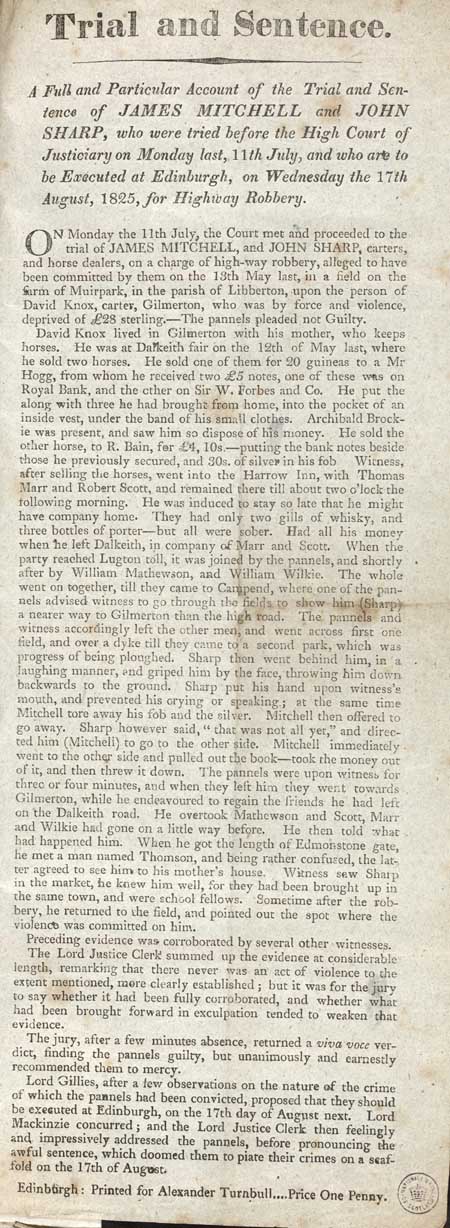Transcription
Trial and Sentence.
A Full and Particular Account of the Trial and Sen-
tence of JAMES MITCHELL and JOHN
SHARP, who were tried before the High Court of
Justiciary on Monday last, 11th July, and who are to
be Executed at Edinburgh, on Wednesday the 17th
August, 1825, for Highway Robbery. ON Monday the llth July, the Court met and proceeded to the
trial of JAMES MITCHELL, and JOHN SHARP, carters,
and horse dealers, on a charge of high-way robbery, alleged to have
been committed by them on the 13th May last, in a field on the
farm of Muirpark, in the parish of Libberton, upon the person of
David Knox, carter, Gilmerton, who was by force and violence,
deprived of £28 sterling.?The pannels pleaded not Guilty. David Knox lived in Gilmerton with his mother, who keeps
horses. He was at Dalkeith fair on the 12th of May last, where
he sold two horses. He sold one of them for 20 guineas to a Mr
Hogg, from whom he received two £5 notes, one of these was on
Royal Bank, and the other on Sir W. Forbes and Co. He put the
along with three he had brought from home, into the pocket of an
inside vest, under the band of his small clothes. Archibald Brock-
ie was present, and saw him so dispose of his money. He sold the
other horse, to R. Bain, for £4, 10s.?putting the bank notes beside
those he previously secured, and 30s. of silver in his fob Witness,
after selling the horses, went into the Harrow Inn, with Thomas
Marr and Robert Scott, and remained there till about two o'lock the
following morning. He was induced to stay so late that he might
have company home. They had only two gills of whisky, and
three bottles of porter?but all were sober. Had all his money
when he left Dalkeith, in company of Marr and Scott. When the
party reached Lugton toll, it was joined by the pannels, and shortly
after by William Mathewson, and William Wilkie. The whole
went on together, till they came to Campend, where one of the pan-
nels advised witness to go through the fields. to show him .(Sharp)
a nearer way to Gilmerton than the high road. The pannels and
witness accordingly left the other men, and went across first one
field, and over a dyke till they came to a second park, which was
progress of being ploughed. Sharp then went behind him, in a
laughing manner, and griped him by the face, throwing him down-
backwards to the ground. Sharp put his hand upon witness's
mouth, and prevented his crying or speaking; at the same time
Mitchell tore away his fob and the silver. Mitchell then offered to
go away. Sharp however said, " that was not all yet," and direc-
ted him (Mitchell) to go to the other side. Mitchell immediately
went to the other side and pulled out the book?took the money out
of it, and then threw it down. The pannels were upon witness for
three or four minutes, and when they left him they went towards
Gilmerton, while he endeavoured to regain the friends he had left
on the Dalkeith road. He overtook Mathewson and Scott, Marr
and Wilkie had gone on. a little way before. He then told what
had happened him. When he got the length of Edmonstone gate,
he met a man named Thomson, and being rather confused, the lat-
ter agreed to see him to his mother's house. Witness sew Sharp
in the market, he knew him well, for they had been brought up in
the same town, and were school fellows. Sometime after the rob-
bery, he returned to the field, and pointed out the spot where the
violence was committed on him. Preceding evidence was corroborated by several other witnesses. The Lord Justice Clerk summed up the evidence at considerable
length, remarking that there never was an act of violence to the
extent mentioned, more clearly established; but it was for the Jury
to say whether it had been fully corroborated, and whether what
had been brought forward in exculpation tended to weaken that
evidence. The jury, after a few minutes absence, returned a viva voce ver-
dict, finding the pannels guilty, but unanimously and earnestly
recommended them to mercy. Lord Gillies, after a few observations on the nature of the crime
of which the paanels had been convicted, proposed that they should
be executed at Edinburgh, on the 17th day of August next. Lord
Mackinzie concurred; and the Lord Justice Clerk then feelingly
and, impressively addressed the pannels, before pronouncing the
awful sentence, which doomed them to piate their crimes on a scaf-
fold on the 17th of August
Edinburgh: Printed for Alexander Turnbull....Price One Penny.
View Commentary | Download PDF Facsimile
|
 |
Date of publication:
1825 shelfmark: F.3.a.13(99)
 View larger image
View larger image
|


